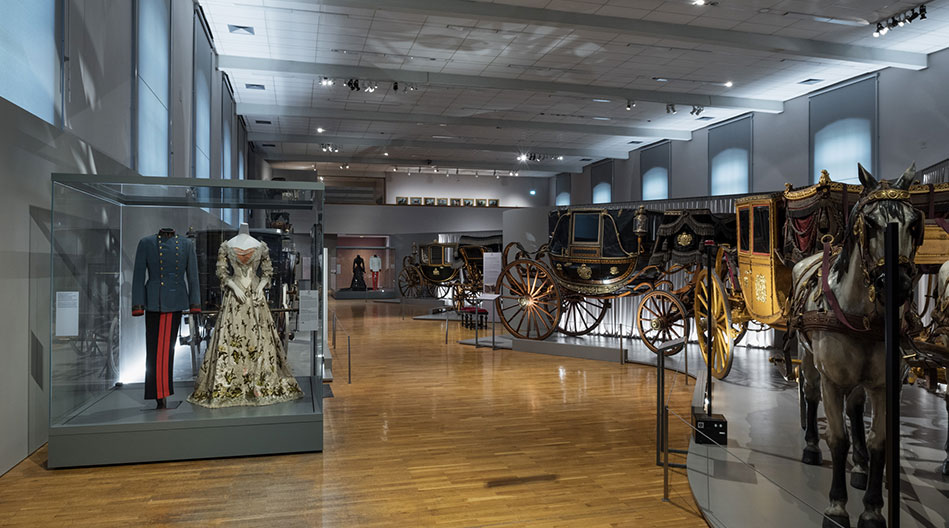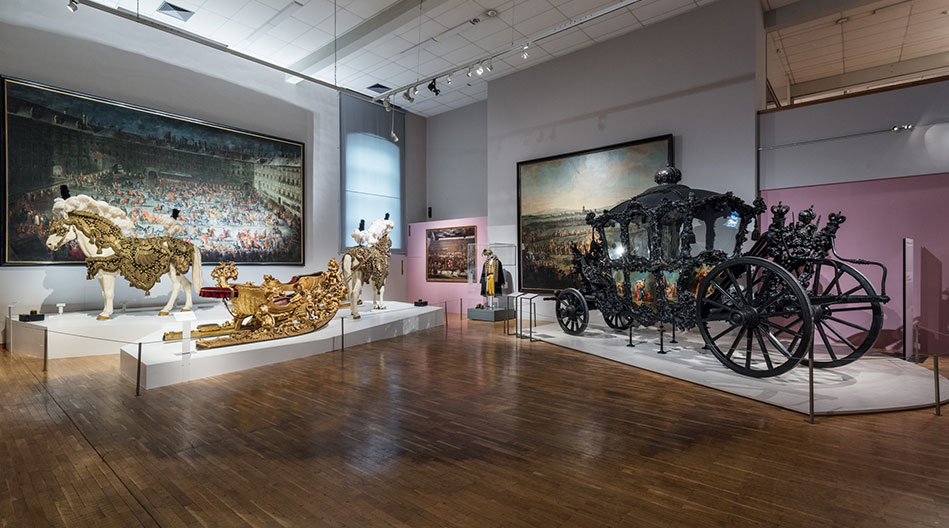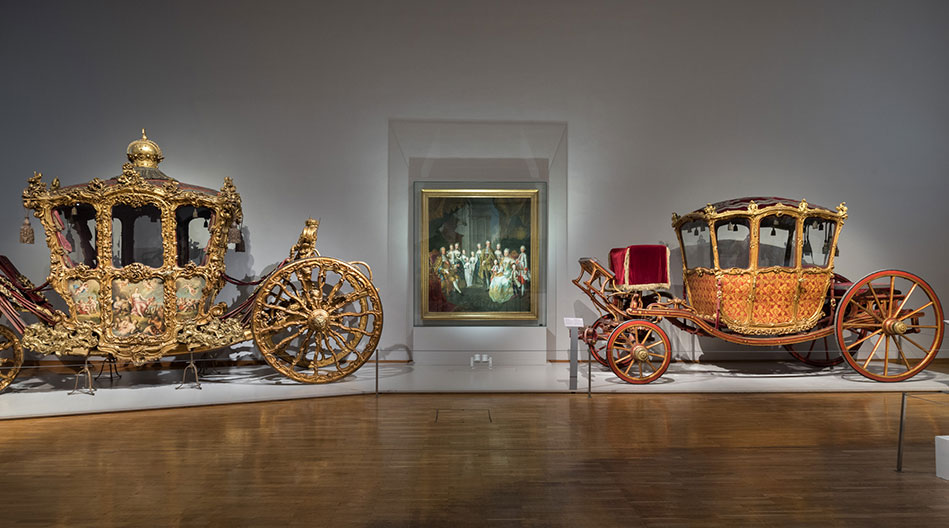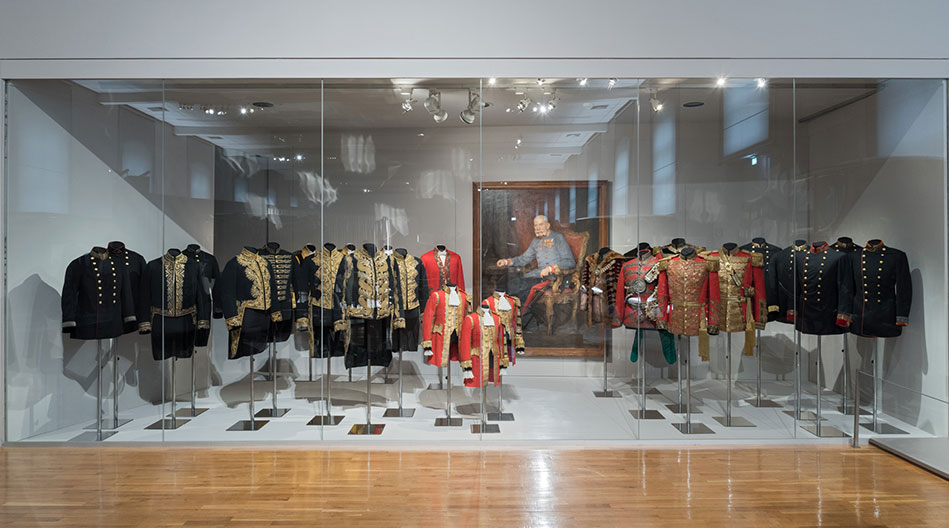![[Translate to English:] [Translate to English:]](/fileadmin/_processed_/1/d/csm_Header-Kaiserliche-Wagenburg-_c_-KWGBG_b5bef841e7.jpg)
Imperial Carriage Museum
The Imperial Carriage Museum is one of Schönbrunn’s most famous attractions. Its magnificent carriages, paintings and robes offer a glimpse of court life – coronations and weddings, cumbersome travels and merry hunts, children’s games and funeral processions. At the same time, it documents the lives of rulers like Maria Theresa, Franz Joseph and (perhaps surprisingly for many) the French Emperor Napoleon. One of its highlights is the “Sisi Trail”, which offers a new and unusual view of the famous Empress, whose life over a century ago was marked by topics that remain current today, such as mobility, sports and the cult of beauty.
Did you know:
- According to the Spanish court ceremonial, nobody was allowed to sit higher than the ruler, and the coronation carriages of the Habsburgs therefore had no coach box
- Napoleon’s son’s small carriage was drawn by two Merino sheep, which had been specially trained by a circus ringmaster
- Different clothes and carriages were required in the 19th century depending on the occasion and the time of day
- Sisi invented the “Viennese wasp waist”, which cinches the waistline sharply and in complete disregard of human anatomy, creating a particularly impressive silhouette
- The first automobiles, such as the “Imperial Car”, were delivered with two exchangeable bodies, an open one for summer and a closed one for winter
Things to see:
For centuries, horse and carriage were among the most important elements of courtly representation. The carriages of the Baroque period, designed and executed by great artists, were not so much "means of transport" as insignia testifying to the importance and dignity of the imperial house. From the late 18th century onwards, technical progress brought about a multitude of new types of carriages, which were now also used by the rising bourgeoisie. In the Carriage Museum you can see the whole range of historical carriage building, from the golden ceremonial carriages of the Baroque period, through travel, transport, leisure and hunting carriages of the 19th century, to the beginnings of the automobile.
The "Sisi Trail" leading through the museum makes the life of the popular ruler comprehensible from her arrival as a bride to her death by means of her carriages, her dresses and unique cult objects. On display are, among other things, her wedding carriage, the miniature carriages of her children, her golden coronation carriage and the carriage she used when she was assassinated in Geneva. At the end of this series is the imposing hearse in which she was carried to her grave. These carriages are presented together with portraits, paintings and unique objects from Sisi's personal possessions: her wedding train, her famous fan and the magnificent original dress with a meter-long train, which brings back to life the empress's impressive appearance with the famous "Viennese wasp waist" invented by her, have achieved cult status. Sisi's only surviving saddle and the "Riding Chapel" with portraits of her countless favorite horses are reminders of her role as the best parcour rider of her time.
Mid March - November
Dezember - Mitte März
Letzter Einlass 15 Minuten vor Schließung
Public
Metro:U4 Hietzing
Tram:10, 52, 60 Schloß Schönbrunn
Bus: 10A Schloß Schönbrunn
Hop On Hop Off
Route: Yellow Line
Bus Stop:
Schloß Schönbrunn
Address
Schönbrunner Schlossstraße,
1130
Vienna
Phone:
+43 1 1 525 24 - 2710





![[Translate to English:] [Translate to English:]](/fileadmin/_processed_/2/2/csm_Schloss_Schoenbrunn_Irrgarten_c__Schloss_Schoenbrunn_Kultur-_und_Betriebsges.m.b.H._Severin_Wurnig_734da5b53e.jpg)
![[Translate to English:] [Translate to English:]](/fileadmin/_processed_/1/b/csm_Wuestenhaus-c-Zupanc_59ee2f5f02.jpg)
![[Translate to English:] [Translate to English:]](/fileadmin/_processed_/a/a/csm_Kronprinzengarten__c__Schloss_Schoenbrunn_a12b019b3f.jpg)
![[Translate to English:] [Translate to English:]](/fileadmin/_processed_/9/8/csm_Schloss_Schoenbrunn_Orangeriegarten__c__Schloss_Schoenbrunn_Kultur-_und_Betriebsges.m.b.H._Alexander_E.Koller_858f4957b4.jpg)
![[Translate to English:] [Translate to English:]](/fileadmin/_processed_/c/6/csm_Kindermuseum_Verkleiden_SKB__Foto_Reza_Sarkari_4b4101304a.jpg)
![[Translate to English:] Copyright Irrgarten des Schloss Schoenbrunn in Wien](/fileadmin/_processed_/a/1/csm_header-schloss-schoenbrunn_9d3d19d730.jpg)
